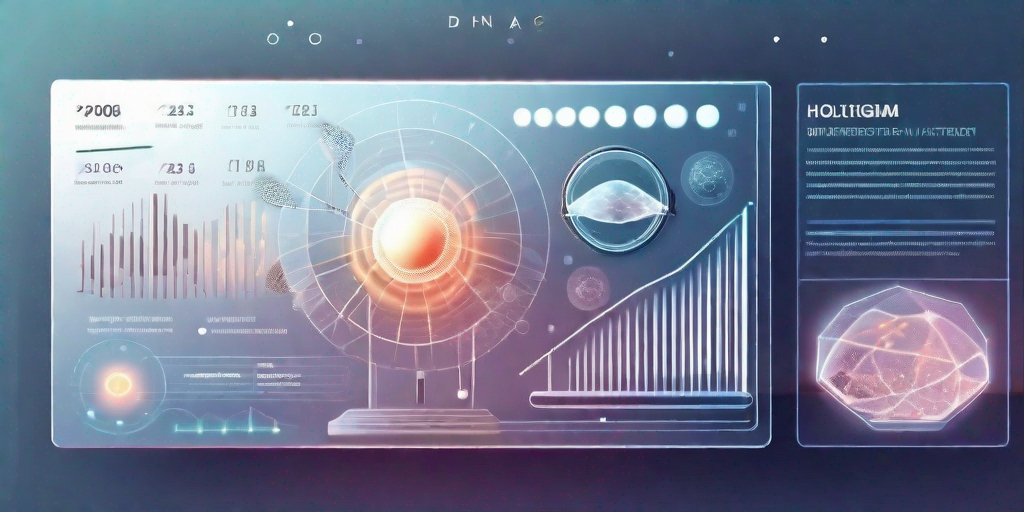Understand Bioinformatics with the Help of an Innovation Speaker

Understand Bioinformatics with the Help of an Innovation Speaker
Bioinformatics is an exciting and fast-growing field that combines biology, computer science, and statistics. It plays a crucial role in our understanding of living organisms and has led to many groundbreaking discoveries. However, the complexity of bioinformatics can be overwhelming, especially for those without a background in the field. Thankfully, an innovation speaker can simplify the concepts and help you grasp the basics of bioinformatics.
Understanding the Basics of Bioinformatics
Before we dive into the role of an innovation speaker in bioinformatics, let's take a moment to understand the fundamentals of this field. Bioinformatics involves the collection, analysis, and interpretation of biological data using computer algorithms and statistical models. It allows us to study genetic information, protein structures, and other biological systems on a large scale. By combining computational techniques with biological knowledge, scientists can uncover meaningful insights and make predictions about the behavior of living organisms.
In bioinformatics, researchers use various tools and databases to analyze vast amounts of biological data. They employ algorithms to align DNA sequences, predict protein structures, or identify genetic variations. To effectively navigate through this sea of information, it is essential to understand the principles and techniques of bioinformatics.
One of the key aspects of bioinformatics is the analysis of DNA sequences. DNA, or deoxyribonucleic acid, is the genetic material that carries the instructions for the development and functioning of all living organisms. By analyzing DNA sequences, scientists can gain insights into the genetic makeup of different species, identify genetic variations that may be associated with diseases, and even trace the evolutionary history of organisms.
Another important area of bioinformatics is the prediction of protein structures. Proteins are large, complex molecules that play crucial roles in various biological processes. Understanding their structure is essential for understanding their function. Bioinformatics tools and algorithms can predict the three-dimensional structure of proteins based on their amino acid sequences. This information is invaluable for drug discovery, as it helps scientists design drugs that can interact with specific proteins and modulate their activity.
Bioinformatics also plays a significant role in the field of genomics. Genomics is the study of an organism's entire genome, which includes all of its genes. By analyzing genomic data, scientists can identify genes associated with specific traits or diseases, study gene expression patterns, and understand the genetic basis of various biological phenomena. Bioinformatics tools enable researchers to analyze and interpret genomic data on a large scale, providing valuable insights into the complexity of living organisms.
Now that you have a basic understanding of bioinformatics, let's explore how an innovation speaker can help simplify the complex concepts associated with this field.
How an Innovation Speaker Simplifies Bioinformatics
When it comes to bioinformatics, the terminology and techniques can seem intimidating to those without a scientific background. An innovation speaker acts as a guide, breaking down complex concepts into easily digestible pieces of information. Through engaging presentations and interactive sessions, they simplify bioinformatics, making it accessible to a wider audience.
An innovation speaker employs visual aids, real-life examples, and storytelling techniques to explain bioinformatics in a relatable way. They demystify technical jargon, ensuring that you grasp the core principles behind bioinformatics. By relating the concepts to everyday experiences, an innovation speaker helps you connect the dots and understand how bioinformatics impacts our lives.
For example, imagine you're sitting in a conference room, listening to an innovation speaker talk about how bioinformatics is used in personalized medicine. They might start by explaining how our genes contain valuable information about our health and susceptibility to certain diseases. They then go on to describe how bioinformatics tools and algorithms can analyze this genetic data to identify potential risks and develop personalized treatment plans. By using relatable examples like this, the innovation speaker makes bioinformatics more tangible and applicable to our own lives.
Furthermore, an innovation speaker brings a fresh perspective to the field of bioinformatics. They highlight the latest trends and advancements, providing valuable insights into how this discipline is evolving. With their expertise, an innovation speaker bridges the gap between scientific research and practical applications, showing you how bioinformatics is being used to tackle real-world problems.
Imagine attending a seminar where an innovation speaker discusses the role of bioinformatics in environmental conservation. They might talk about how bioinformatics is used to analyze DNA samples from endangered species, helping researchers understand their genetic diversity and develop conservation strategies. This kind of real-world application not only showcases the importance of bioinformatics but also inspires individuals to explore its potential in their own fields.
Moreover, an innovation speaker doesn't just focus on the technical aspects of bioinformatics. They also shed light on the ethical considerations and challenges associated with this field. They discuss topics like data privacy, the responsible use of genetic information, and the potential biases in algorithms. By addressing these critical issues, an innovation speaker encourages a well-rounded understanding of bioinformatics and its implications.
In conclusion, an innovation speaker plays a crucial role in simplifying bioinformatics for a broader audience. Through engaging presentations, relatable examples, and a fresh perspective, they make this complex field accessible and relevant. By attending their sessions, you can gain a deeper understanding of bioinformatics and its potential to revolutionize various industries.
The Role of Bioinformatics in Innovation and Tech
Bioinformatics is not just a scientific endeavor; it also plays a crucial role in innovation and technology. By analyzing genetic data, researchers can develop new drugs, improve agricultural practices, and even advance personalized medicine. Bioinformatics has revolutionized various industries and has the potential to shape the future of healthcare, agriculture, and the environment.
An innovation speaker sheds light on the intersection of bioinformatics and innovation, highlighting the immense possibilities that arise when these two fields converge. They showcase how bioinformatics is driving technological advancements, enabling us to understand diseases better, develop targeted therapies, and create sustainable solutions.
Engaging with an Innovation Speaker on Bioinformatics
Attending a session with an innovation speaker, whether in person or virtually, offers a unique opportunity to engage with the topic of bioinformatics. You can ask questions, participate in discussions, and gain a deeper understanding of the subject matter. An innovation speaker encourages interaction, ensuring that you leave the session with a clearer comprehension of bioinformatics and its practical applications.
During the session, the innovation speaker may delve into the fascinating world of genetic sequencing. They may explain how bioinformatics tools and algorithms are used to analyze vast amounts of genetic data, providing valuable insights into the functioning of genes and their role in various diseases. By understanding the genetic basis of diseases, researchers can develop targeted therapies that have the potential to revolutionize healthcare.
In addition to healthcare, bioinformatics also has significant implications for agriculture. The innovation speaker may discuss how bioinformatics is being used to improve crop yields, enhance disease resistance in plants, and develop genetically modified organisms (GMOs) that are more resilient to environmental challenges. These advancements in agricultural bioinformatics have the potential to address food security concerns and contribute to sustainable farming practices.
The innovation speaker may also touch upon the role of bioinformatics in personalized medicine. They may explain how analyzing an individual's genetic makeup can help predict their susceptibility to certain diseases and guide treatment decisions. By tailoring medical interventions based on a person's unique genetic profile, personalized medicine has the potential to improve patient outcomes and reduce healthcare costs.
Furthermore, the innovation speaker may discuss the ethical considerations surrounding bioinformatics. They may explore questions such as data privacy, informed consent, and the responsible use of genetic information. By addressing these ethical concerns, the speaker encourages a thoughtful and well-rounded discussion on the future of bioinformatics and its impact on society.
Overall, attending a session with an innovation speaker on bioinformatics provides a comprehensive overview of this rapidly evolving field. It offers a glimpse into the exciting possibilities that lie ahead and highlights the transformative power of bioinformatics in driving innovation and technological advancements. By engaging with the topic and interacting with the speaker, you can gain a deeper appreciation for the role of bioinformatics in shaping the future of healthcare, agriculture, and the environment.
The Practical Applications of Bioinformatics Explained
Now that we have covered the basics and the role of an innovation speaker in simplifying bioinformatics, it's time to explore the practical applications of this field. Bioinformatics has a wide range of real-world applications, including:
- Genomics: Bioinformatics is critical in analyzing and interpreting genomic data. It helps researchers understand the structure, function, and evolution of various genomes, paving the way for personalized medicine and tailored treatments.
- Drug Discovery: By analyzing biological data, bioinformatics aids in the discovery of new drugs and the understanding of drug interactions. It accelerates the process of drug development, making it more efficient and cost-effective.
- Agriculture and Food Security: Bioinformatics helps improve crop yield, develop disease-resistant plants, and promote sustainable farming practices. It plays a vital role in ensuring food security by enhancing agricultural productivity.
- Biotechnology: Bioinformatics has transformed the field of biotechnology by enabling researchers to engineer proteins, design new enzymes, and optimize industrial processes. It has opened doors to innovative solutions in various industries, from renewable energy to manufacturing.
Genomics, a branch of bioinformatics, has revolutionized the field of healthcare. By studying the genetic makeup of individuals, researchers can identify genetic variations that may contribute to diseases such as cancer, diabetes, and heart disease. This knowledge allows for the development of targeted therapies and personalized treatment plans, improving patient outcomes and reducing healthcare costs.
Furthermore, bioinformatics tools and algorithms enable scientists to compare and analyze large datasets of genomic information. This analysis helps identify genes associated with specific traits or diseases, providing valuable insights into human biology and potential therapeutic targets.
The field of drug discovery has greatly benefited from bioinformatics. By utilizing computational methods, scientists can predict the behavior of molecules and their interactions with biological targets. This enables the identification of potential drug candidates with higher accuracy and reduces the need for costly and time-consuming experimental testing.
Bioinformatics also plays a crucial role in understanding drug interactions, which is essential for patient safety. By analyzing genomic and proteomic data, researchers can identify genetic variations that affect an individual's response to certain medications. This knowledge allows for personalized medicine, where treatments can be tailored to an individual's genetic profile, maximizing efficacy and minimizing side effects.
In the face of a growing global population and climate change, bioinformatics offers innovative solutions to enhance agricultural productivity and ensure food security. By analyzing genomic data from crops, scientists can identify genes responsible for desirable traits such as disease resistance, drought tolerance, and increased yield.
This knowledge allows for the development of genetically modified crops that can withstand environmental stresses and produce higher yields. Additionally, bioinformatics tools enable researchers to study the complex interactions between crops, pests, and pathogens, leading to the development of more effective and sustainable pest management strategies.
Bioinformatics plays a crucial role in the field of biotechnology, where it is used to analyze and interpret biological data to develop innovative solutions. By studying the structure and function of proteins, bioinformaticians can design new enzymes with improved properties, such as increased stability or enhanced catalytic activity.
Furthermore, bioinformatics tools are utilized to optimize industrial processes, such as the production of biofuels or pharmaceuticals. By analyzing and modeling biological systems, scientists can identify bottlenecks and optimize the efficiency of these processes, leading to more sustainable and cost-effective production methods.
These are just a few examples of how bioinformatics is making a significant impact in different sectors. An innovation speaker can delve into these applications, showcasing the practical benefits of bioinformatics and inspiring you to explore its potential further.
Conclusion
Bioinformatics may seem complex at first glance, but with the help of an innovation speaker, you can gain a deeper understanding of this fascinating field. By simplifying the concepts, providing real-life examples, and highlighting practical applications, an innovation speaker makes bioinformatics accessible and relatable.
Whether you are a student curious about the intersection of biology and technology or a professional looking to stay informed about the latest advancements, attending a session with an innovation speaker can be an enlightening experience. Bioinformatics holds immense potential, and with the guidance of an innovation speaker, you can unlock new insights and possibilities in this exciting field.
Frequently Asked Questions
1. What is bioinformatics and why is it important?
Bioinformatics is a field that combines biology, computer science, and statistics to analyze and interpret biological data using computational techniques. It plays a crucial role in our understanding of living organisms, allowing us to study genetic information, protein structures, and other biological systems on a large scale.
2. How can an innovation speaker simplify the complex concepts of bioinformatics?
An innovation speaker simplifies bioinformatics by breaking down complex concepts into easily digestible pieces of information. They use visual aids, real-life examples, and storytelling techniques to explain bioinformatics in a relatable way. By relating the concepts to everyday experiences, an innovation speaker helps the audience understand how bioinformatics impacts their lives.
3. What are some practical applications of bioinformatics?
Bioinformatics has a wide range of practical applications, including genomics, drug discovery, agriculture and food security, and biotechnology. It helps researchers analyze genomic data, develop new drugs, improve crop yield, design enzymes, and optimize industrial processes. Bioinformatics is revolutionizing various industries and has the potential to shape the future of healthcare, agriculture, and the environment.
Contact an Innovation Speaker for Your Event
Now that you've delved into the fascinating world of bioinformatics, it's time to bring that knowledge to your next event. Hiring Dr Mark van Rijmenam, an esteemed Innovation Speaker, will undoubtedly engage and enlighten your audience. With his ability to simplify complex concepts and showcase real-life applications, Dr van Rijmenam will make bioinformatics relatable and accessible to all attendees. Whether you're hosting a conference, seminar, or any other event, Dr van Rijmenam's insights into this exciting field will captivate your audience and leave them eager to explore the potential of bioinformatics further. To hire Dr Mark van Rijmenam for your next event, simply complete the form below. We promise to be in touch within 24 hours, ready to bring a new dimension of understanding to your audience.
Thanks for your inquiry
We have sent you a copy of your request and we will be in touch within 24 hours on business days.
If you do not receive an email from us by then, please check your spam mailbox and whitelist email addresses from @thedigitalspeaker.com.
In the meantime, feel free to learn more about The Digital Speaker here.
Or read The Digital Speaker's latest articles here.





